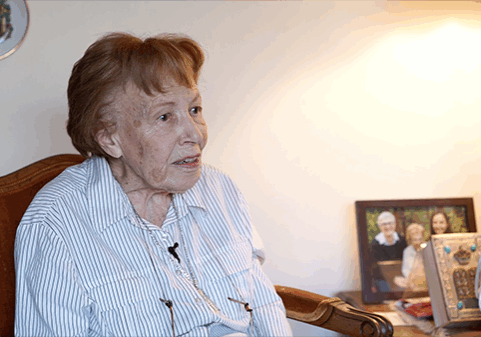Here in Gary

“I wouldn’t want to live any other place.”
Hold a Conversation
Can you imagine leading a conversation about this story? Where? With whom? What kinds of questions would you pose? (See How to use the questions for reflection for one approach.) Please email your questions to us or post them in the comment box for our consideration. If you use them in an actual discussion, let us know how the conversation went.
Transcript for Here in Gary
My dad worked on the EJ&E Railroad. And he had bought some lots in Glen Park. He bought two lots, and he helped build a small house on one lot, while he started a bigger house next door. That was at 44th and Maryland Street.
It was multinational. Polish people seemed to go on one lot, and the – we were German – and we lived on Maryland Street. My first girlfriends were Polish, and they lived on 45th Avenue. And we all started at Riley School. It’s gone now.
About the time I was aware that the blacks came in was when Joe Louis won his biggest fight. I remember, because there was a Roxy Theatre on Broadway near Ridge Road. There was a whole group of black people came down for this big fight that he had won. And I was a kid – I was probably 12 or 13 years old. But that was a big affair.
The depression was real tough, here in Gary, and Miller – every place. This whole area, I think, was hit hard by the depression. I can remember we were poor, and my mother was working in a grocery store then. They were divorced. A lot of people were on relief. I had won a scholarship to the University of Chicago, but I couldn’t afford the tuition. So, junior college was wonderful. I think we only paid about eight dollars. They had three junior colleges in Chicago then, and they all had the same curriculum as the University of Chicago, so you couldn’t beat it.
At the junior college, I was lucky enough to meet Joe. He was Jewish, which was new to me, except my mother had worked for a lot of Jewish people. We were sitting next to one another in a humanities class, and I loved – that’s a course everybody should have. Humanities is one of the best courses that you can have – and one day he said, “Let’s ditch school. Let’s ditch school and go to a movie.” So we did.
And when my dad met Joe, he said, “Doesn’t he have any money?” I said, “No, his father has a grocery store and he works there, and his mother is alive, and he’s working in the grocery story part time, but he’s going to school.” And he said, “But you walk all the time!” I said, “That’s good exercise!” And, “He doesn’t have a lot of money, dad.” So we enjoyed walking, and we did – we walked a lot.
It was love at first sight, I really think so. We had 73 years together. He was the handsomest guy – everyone will agree with that.
Well, first we lived near the beach, here. We didn’t have a lot of money but we rented a basement apartment. David was born, and about that time Joe was drafted. I had to move anyway, and I was living on – the allotment was like $80 a month. It was very small.
Because I was a war widow – they called us war widows – I got cheap rent. I had one big room, a bathroom, and a small bedroom. That’s all we got. I don’t think the project is there anymore. It’s homes now. But I can remember, the project was… you had to hang your clothes in the living room. There was no place. In the summer you could hang it outdoors. But it was tough. They didn’t make anything easy for anyone then.
David didn’t go to Wert. He went to the old Miller school on Lake Street, you know, that old building. I think it’s an art center now. But that’s where he first went to school. But later, the population grew so much here in Miller that they couldn’t meet there; there was no room. So they were meeting in the general office of the project. Some of the kids went to kindergarten there, because the population had grown here in Miller.
The attraction of the lake! This was – this has always been the prettiest part of Gary. There were parts of Glen Park that were beautiful, but nothing like Miller. Miller has been… oh, I wouldn’t want to live any other place.
